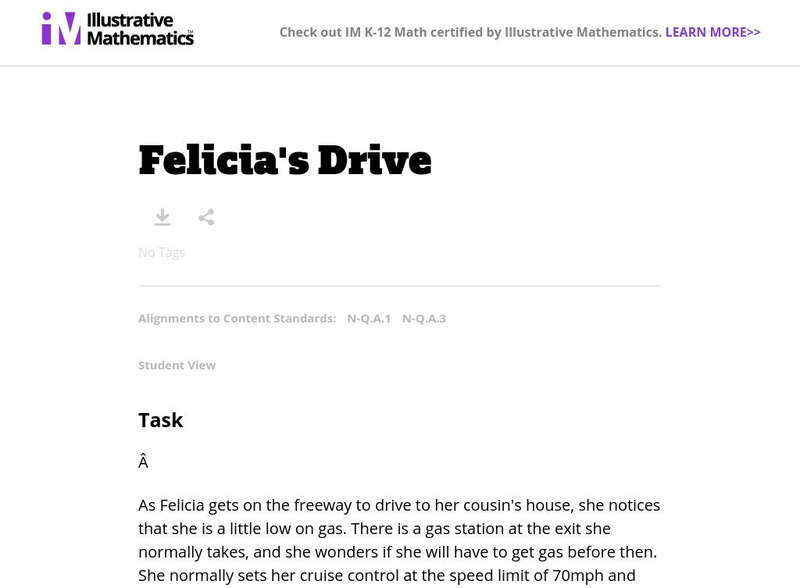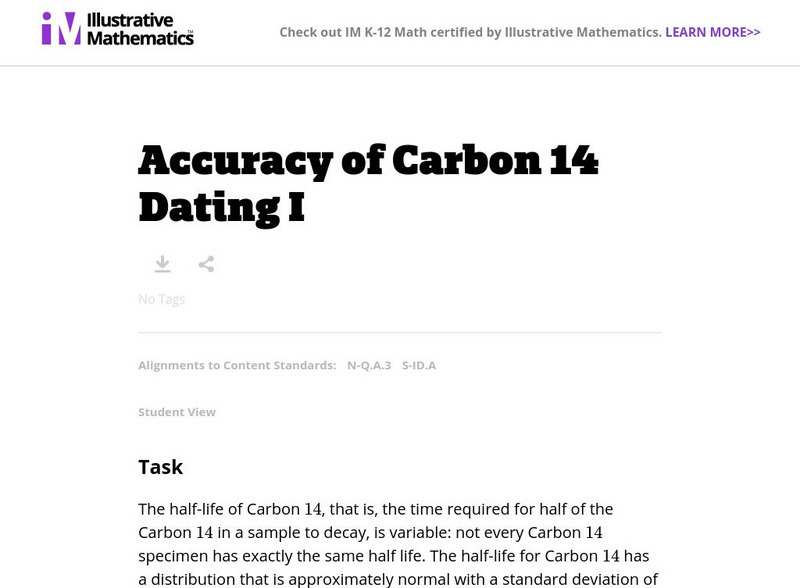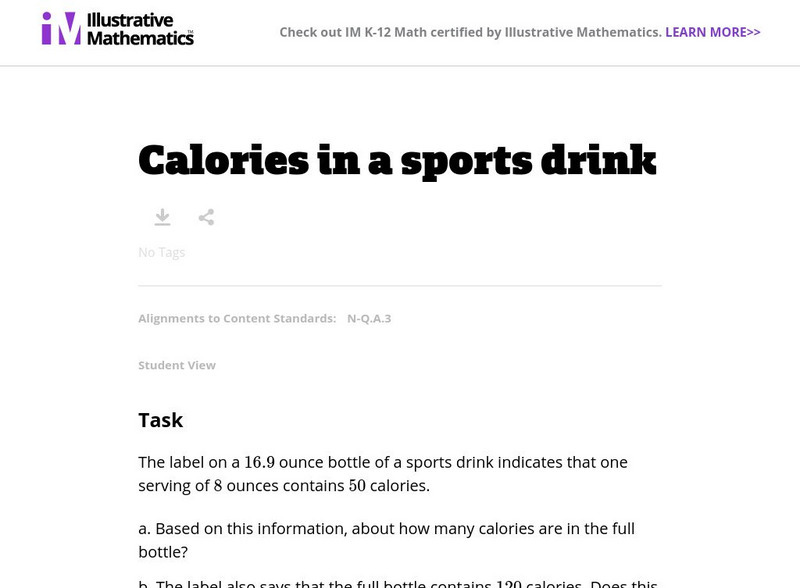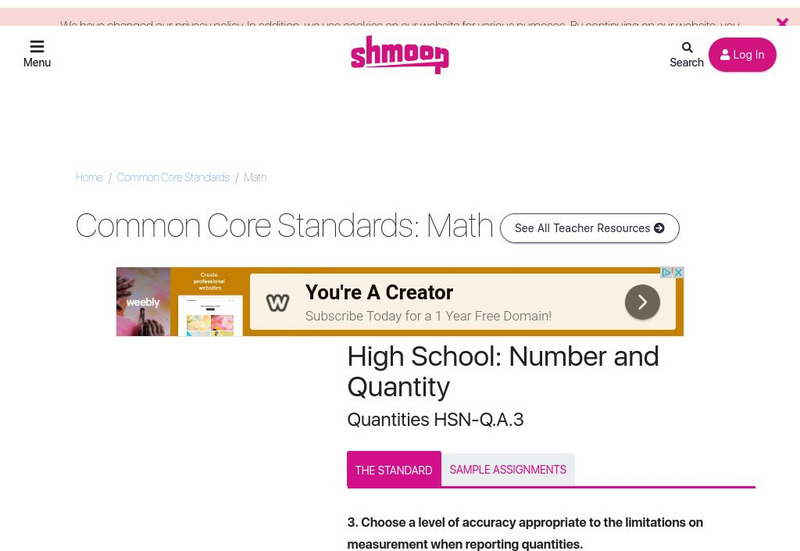Curated OER
Precision and Accuracy in Measurement
In this Algebra I activity, students differentiate between precision and accuracy is measurement. The four page activity contains thirty-five problems. Answers are not included.
Science Buddies
Science Buddies: Measuring Up
Measurements are very important for scientists. It is especially important that the measurements be accurate. Think about how important accuracy is when you want to know if you are taller than a friend of yours, every inch counts. In...
Arcademics
Arcademics: Ratio Martian
Ratio Martian provides practice in recognizing ratios. The martian is always hungry and eats ratios to survive.
TED Talks
Ted: Ted Ed: What's the Difference Between Accuracy and Precision?
When we measure things, most people are only worried about how accurate, or how close to the actual value, they are. Looking at the process of measurement more carefully, you will see that there is another important consideration:...
Arcademics
Arcademics: Integer Warp Multiplying Integers
Integer Warp is a multi-player racing game that allows students from anywhere in the world to race one another while practicing multiplying integers!
Hooda Math
Hooda Math: Multiplication Bubble Pop
Hooda Math games provide students extra practice in a variety of math skills. Multiplication Bubble Pop Instructions: Solve multiplication problems, then tap correct bubbles to pop them before they reach the top of the screen! This game...
Simon Fraser University
Chem1 Virtual Textbook: Error and Uncertainty in Measured Values
As part of a larger site called "Getting started in Chemistry," this site examines various topics related to measurements and the error and uncertainty that accompanies the methods of measurements.
Ministry of Education, Sports & Culture (Samoa) Government
Mesc: Samoa School Net: Limits of Accuracy
This module looks at the history of measurement, beginning with non-standard units, the advent of standard units (in this case metric), and when approximation or precision would be needed.
Illustrative Mathematics
Illustrative Mathematics: N q.a.1 and N q.a.3: Felicia's Drive
This task requires students to make some sensible approximations of the amount of gas needed for a drive. They must choose a level of accuracy appropriate to limitations on measurement when reporting quantities. Aligns with N-Q.A.1 and...
Illustrative Mathematics
Illustrative Mathematics: N q.a: Traffic Jam
This task, codes to all three standards in this cluster, and also offers students an opportunity to practice modeling (MP4). Students must attempt to make reasonable assumptions about the average length of vehicles in the traffic jam and...
Illustrative Mathematics
Illustrative Mathematics: N q.a.3, N q.a.1, N q.a.2: Weed Killer
The principal purpose of the task is to explore a real-world application problem with algebra, working with units and maintaining reasonable levels of accuracy throughout. Aligns with N-Q.A.3, N-Q.A.1, and N-Q.A.2.
Illustrative Mathematics
Illustrative Mathematics: N q.a.3 and S id.a: Accuracy of Carbon 14 Dating I
This task examines, from a mathematical and statistical point of view, how scientists measure the age of organic materials by measuring the ratio of Carbon 14 to Carbon 12. The focus here is on the statistical nature of such dating....
Illustrative Mathematics
Illustrative Mathematics: N q.a.1: Runners' World
This task provides students with an opportunity to engage in Standard for Mathematical Practice 6, attending to precision. It intentionally omits some relevant information. Aligns with N-Q.A.1.
Illustrative Mathematics
Illustrative Mathematics: N q.a.3: Dinosaur Bones
The purpose of this task is to illustrate through an absurd example the fact that in real life quantities are reported to a certain level of accuracy, and it does not make sense to treat them as having greater accuracy. Aligns with N-Q.A.3.
Illustrative Mathematics
Illustrative Mathematics: N q.a.3: Calories in a Sports Drink
The goal of the task is to stimulate a conversation about rounding and about how to record numbers with an appropriate level of accuracy, tying in directly to the standard N-Q.3. Aligns with N-Q.A.3.
Math Is Fun
Math Is Fun: Approximate Solutions
Sometimes it is difficult to solve an equation exactly. But an approximate answer may be good enough!
Sophia Learning
Sophia: Reporting Volume Measurements: Lesson 2
This lesson will explain how to determine the precision of a measurement using laboratory glassware and report it accurately. It is 2 of 2 in the series titled "Reporting Volume Measurements."
Math Is Fun
Math Is Fun: Accuracy and Precision
The difference between accuracy and precision is explained, with a precautionary note about being aware of possible bias in the measuring instrument.
Shmoop University
Shmoop: High School: Number and Quantity: Quantities Hsn q.a.3
Standard HSN-Q.A.3 states: "Choose a level of accuracy appropriate to limitations on measurement when reporting quantities." This page explains what this standard means. Click on 'Sample Assignments' for some quick drills.
CK-12 Foundation
Ck 12: Physical Science: Accuracy and Precision
[Free Registration/Login may be required to access all resource tools.] Accuracy and precision of measurements.

















